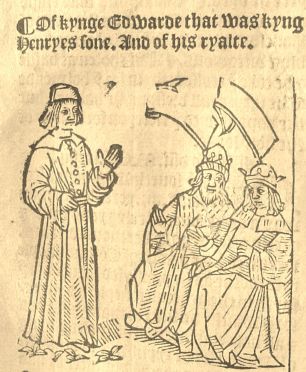It seems to us a curious feature of an old law that people who owed money could be locked up in prison until they paid. Dickens wrote about it, and he knew because his family had suffered it. If debtors have no money to pay their debt, how can they possibly get money when they are in prison? The laws that introduced this practice first appeared in 1285, in the reign of King Edward I, and they were copied out in Norman French in the Cathedral Library manuscript called Q. 36, the lawyer’s handbook.

Woodcut of King Edward I discussing laws. Image copyright the Dean and Chapter of Worcester Cathedral (UK).
The law was originally made to protect the interests of merchants, in particular merchants who came into England from abroad, for the very good reason that “des marchaunz sustrez de venir en ceste terre a dammage de tut le realme” – merchants refuse to come to this land, which is harmful to all the kingdom. The law was called the Statute of Merchants. Anyone who lives in Worcestershire or a neighbouring county will be interested to learn that it was first devised at a meeting of Parliament held in the Shropshire village of Acton Burnell:“le Rei par lui e par lur conseil e a son Parlement qe il tint a Actone Burnel apres la seint Michel en le an de son regne unzime” – the king and his council and his Parliament at Acton Burnell after the feast of Saint Michael in the eleventh year of his reign.
How could a Parliament possibly be held at such a small place? The king spent a lot of time travelling around his kingdom, and it is probable he came to Acton Burnell to stay with Robert Burnell, Bishop of Bath and Wells, and Lord Chancellor of England. Parliament was a group of important people, bishops, abbots, barons and nobles invited to meet together to counsel the King. The stone gable ends of a large barn called the Parliament Building which was probably the meeting place can still be seen today.

Map of Acton Burnell (centre) and Shropshire, 1752. Image copyright the Dean and Chapter of Worcester Cathedral (UK).
The law said that creditors should apply to have their loans recorded “devant le meir ou devant autre chief gardeyn de ville” – by the mayor or other chief officer of the town. The debt should be recorded on a “roule double dont le un demerge vers le meir ou chief gardein” – on a double roll of which one part should stay with the officer. And if the debt is not paid by the date agreed then “le meyr ou le chief gardeyn prendra le cors al dettour sil est laye e liverer a la prison de la ville” – the mayor or chief officer shall take the person of the debtor, if he is lay, and take him to the town prison.
The little phrase “if he is lay” is another sign of the times. It means if he is not a member of a religious order, bishop, priest, monk or friar, as clerics could often only be punished by religious courts. Their property could be seized to pay their debts but they could not be imprisoned. Prisoners would stay until they had sorted out a way of paying their debt from “ses chateus e ses terres” – their money and their property. It is assumed that the debtor will have enough property to pay the debt, and thus will only be a short time in prison. Meanwhile the merchant creditor “le trese payn e ewe” – provides him with bread and water. Prisoners were supposed to find their own food, and those that could not might die from starvation.
The final paragraph has a sting in its tail: to pay for all this administration the King will collect a new tax: “e a sustenir les custages . . . si prendra le rei de chescune livre un denier” – to pay for these costs the king shall take from every pound, one penny. Here is the reason why the measure had to be approved by the Parliament. But at that time there were 240 pennies in the pound so the tax was not quite so high as it would be today! After Magna Carta the king could only raise taxes with the consent of his nobles and bishops. And a whole lot of English history followed from that simple rule!

Q.36, the ‘Lawyer’s Handbook’. Image copyright the Dean and Chapter of Worcester Cathedral (UK).
Here are a few more notes on the Norman French found in the Q. 36 manuscript. Some words include a letter ‘s’ which no longer exists today. The word ‘ceste’ in the second paragraph would be written ‘cette’ today. Some Norman French words are used in modern English in exactly the same form as written here: ‘realm’, ‘double’ and ‘prison’ are examples. The scribes often used letters ‘i’ and ‘y’ rather indiscriminately, hence the word for mayor is sometimes written ‘meir’ and sometimes ‘meyr’; similarly the word for officer is sometimes ‘gardein’ and seomtimes ‘gardeyn’. And both have evolved into the modern English words for mayor and guardian!
Tim O’Mara

One thought on “More Norman French Laws: The Parliament of Acton Burnell”